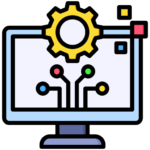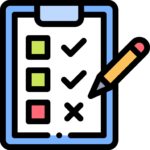Primary
Primary - Teaching Methodologies

Differentiated Instruction
Teachers differentiate instruction to meet the varying needs, interests, and learning styles of students.
Instruction may be adapted through flexible grouping, tiered assignments, and varied materials and resources.

Interactive Learning
Emphasis is placed on interactive learning experiences that actively engage students in the learning process.
Activities such as group discussions, debates, cooperative learning, and peer collaboration are utilized.

Hands-On Activities
Learning is reinforced through hands-on activities and experiences that allow students to manipulate objects, conduct experiments, and solve problems.
This approach fosters experiential learning and helps students develop critical thinking and problem-solving skills.

Inquiry-Based Learning
Students are encouraged to ask questions, explore topics of interest, and investigate real-world problems.
Inquiry-based learning promotes curiosity, critical thinking, and independent learning skills.

Technology Integration
Technology tools and resources are integrated into instruction to enhance learning experiences and facilitate student engagement.
Interactive whiteboards, educational apps, multimedia presentations, and online resources are used to support teaching and learning.

Project-Based Learning
Students engage in extended, interdisciplinary projects that require them to research, plan, collaborate, and present findings.
Project-based learning promotes deeper understanding, creativity, and application of knowledge in authentic contexts.

Cooperative Learning
Collaborative learning activities are incorporated to promote teamwork, communication, and social skills.
Students work together in small groups to solve problems, complete tasks, and achieve shared goals.

Literature-Based Instruction
Literature is used as a central component of instruction to promote reading comprehension, critical thinking, and language development.
Students engage with a variety of texts, including fiction, nonfiction, poetry, and informational texts.

Scaffolding and Guided Practice
Teachers provide scaffolding and guided practice to support students as they learn new concepts and skills.
Gradual release of responsibility is employed, with teachers initially modeling tasks and gradually providing more independence to students.

Assessment for Learning
Formative assessment strategies, such as observation, questioning, and informal checks for understanding, are used to monitor student progress and inform instruction.
Assessment data is used to provide feedback, adjust instruction, and support student learning.
Primary - Global Explorer Curriculum
- Reading comprehension: Developing fluency, comprehension, and critical thinking skills through age-appropriate texts. Writing skills: Learning to express ideas coherently, using correct grammar, punctuation, and spelling. Vocabulary development: Expanding vocabulary through reading, writing, and word study activities.
- Speaking and listening: Practicing effective communication skills through discussions, presentations, and listening activities.
- Number sense: Understanding and working with whole numbers, fractions, decimals, and basic operations.
- Geometry and measurement: Exploring shapes, angles, area, perimeter, volume, time, and money.
- Data analysis and probability: Collecting, organizing, and interpreting data; understanding basic concepts of probability.
- Problem-solving: Developing strategies to solve mathematical problems and apply mathematical concepts to real-life situations.
- Life science: Exploring living organisms, their characteristics, habitats, life cycles, and ecosystems.
- Physical science: Investigating properties of matter, forces, energy, motion, and simple machines.
- Earth and space science: Learning about Earth’s systems, weather, climate, rocks, fossils, and space exploration.
- Geography: Studying maps, continents, countries, regions, landforms, and natural resources.
- History: Exploring historical events, figures, cultures, civilizations, and societal developments.
- Civics and government: Understanding the rights, responsibilities, and structures of government, as well as citizenship and democracy.
- Visual arts: Exploring various art forms, techniques, and styles; expressing creativity through drawing, painting, sculpture, and crafts.
- Music: Developing musical appreciation, rhythm, melody, and basic music theory through singing, listening, and playing instruments.
- Drama and theater: Engaging in dramatic play, improvisation, storytelling, and theatrical performances to enhance communication and expression.
- Developing motor skills, coordination, balance, and fitness through various physical activities, games, and sports.
- Promoting teamwork, sportsmanship, leadership, and healthy lifestyle habits.
Fostering ethical behavior, empathy, respect, responsibility, integrity, and resilience through character education programs and social-emotional learning activities.




